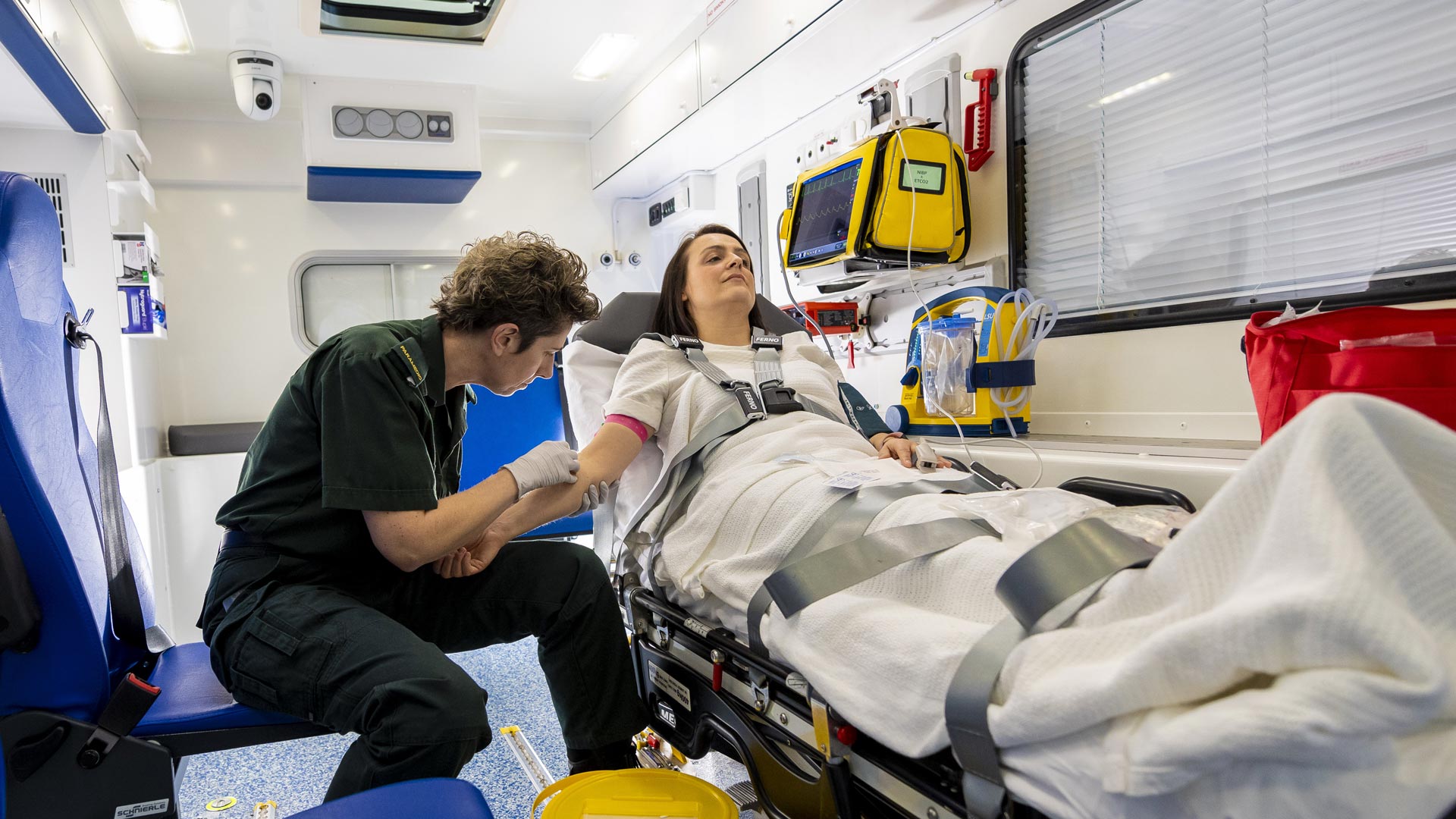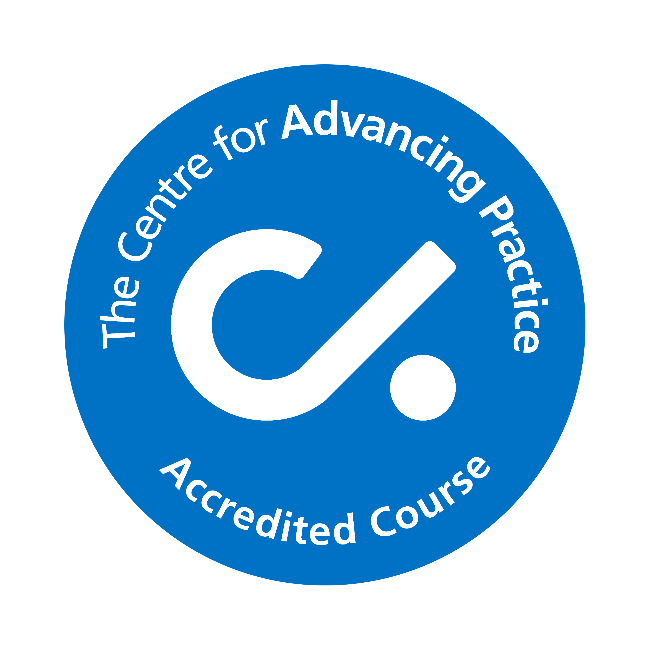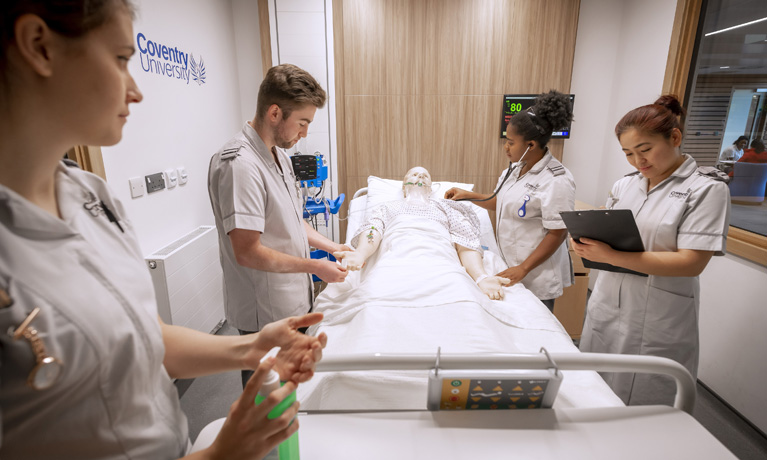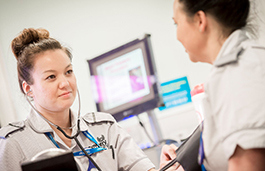Search
Advanced Clinical Practice MSc
Study level: Postgraduate
This master’s course aims to provide continuing professional development for a range of healthcare professions and is rooted in the Framework for Advanced Clinical Practice (HEE, 2017).
Course features
Year of entry
2024-25
Location
Coventry University (Coventry)
Coventry University (Vauxhall, London)
Study mode
Part-time
Duration
3 years part-time
Course code
various - see overview section
Start date
September 2024
January 2025
Course overview
This course is designed to enhance your ability to work across clinical teams and take on leadership responsibilities in multi-disciplinary roles, and ultimately enhance the care provided for patients.
You will have the chance to utilise evidence and research to shape your practice and current and future healthcare delivery through innovation and change.
Joint Top Modern University for Career Prospects
Guardian University Guide 2021 and 20225 QS Stars for Teaching and Facilities
QS Stars University RatingsTop 5 UK Student City in England (Coventry)
QS Best Student Cities Index 2024Why you should study this course
This course is aimed at experienced healthcare practitioners registered with a relevant professional body (NMC/HCPC/GPharmC) who wish to be prepared to fulfil specific Advanced Clinical Practitioner roles, upon successfully completing the course.
Successful completion of the course will prepare you to:
- Become expert clinicians and clinical leaders - educating, developing and building teams.
- Enhance the quality and standard of patient care
- Influence the strategic direction of patient care within your own field of practice
- Develop into an enquiring and reflective clinician.
The Advanced Clinical Practice MSc is approved and supported through Health Education England, working across the West Midlands, the West Midlands ACP Forum and West Midlands Universities Advanced Practice Group.
You can study this degree via the following pathways:
- HLST221 Advanced Clinical Practice MSc (Integrated Care Pathway) - Coventry, September and January starts
- HLST223 Advanced Clinical Practice MSc (Urgent and Emergency Care Pathway) - Coventry, September and January starts
- HLST226 Advanced Clinical Practice MSc (Generic Pathway) - Coventry, September and January starts
- HLST213 Advanced Clinical Practice MSc (General Pathway) - Coventry, September and January starts
- HLST215 Advanced Clinical Practice MSc (Musculoskeletal Pathway) - Coventry, January start
- HLST217 Advanced Clinical Practice MSc (Neonatal Pathway) - Coventry, January start
- HLST217H Advanced Clinical Practice MSc (Neonatal Pathway) - London, September start
- HLST219 Advanced Clinical Practice MSc (Children and Young People Pathway) - Coventry, January start
- HLST219H Advanced Clinical Practice MSc (Children and Young People Pathway) - London, September start
- HLST249 Advanced Clinical Practice MSc (Mental Health Pathway) - Coventry, January start
- HLST277 Advanced Clinical Practice MSc (Mental Health Non-prescribing Pathway) - Coventry, January start
It is also available as a Level 7 apprenticeship, which some NHS Trusts fund through the apprenticeship levy.
Accreditation and professional recognition
This course is accredited1 and recognised by the following bodies:

The Centre for Advancing Practice
Health Education England's Centre for Advancing Practice has been established to standardise post-registration education by accrediting advanced practice courses that achieve the standards outlined in the multi-professional Advanced Practice Framework. Practitioners who have completed accredited education programmes will be eligible to be listed on the Centre's Advanced Practice Directory. Programme accreditation from the Centre for Advancing Practice will bring a new level of consistency to the workforce and help showcase advanced practice within health and social care.
Memberships
Members of Association of Advanced Practice Educators (AAPE).
I just wanted to say how much I enjoyed Advanced Health Assessment and Diagnostic Medicine modules (and independent prescribing last year too!). Both modules were interesting and challenging in equal measure, delivered by passionate, credible lecturers. I've been lucky enough to study at a few universities now, and I have to say I would recommend Coventry to all my healthcare colleagues.
Mary Harrison, Trainee ACP and Clinical Academic Nurse, Wellcome Trust Doctoral Fellow, quoted April 2023

What you'll study
We regularly review our course content, to make it relevant and current for the benefit of our students. For these reasons, course modules may be updated.
How you'll learn
A wide range of educationally transformative learning opportunities are designed to develop clinical practice and other skills. These include simulation, role-specific work-based learning utilising expertise from the breadth of clinical practice and up-to-date approaches including problem-based scenarios from the real world of practice.
Inter-professional and collaborative experiences are at the heart of the course. The development in the final year of a proposal for a service improvement project will give you the opportunity to develop project leadership skills. The importance of effective supervision/mentorship in practice is afforded high priority and emphasis since it is crucial in helping you to apply theory to practice.
Teaching contact hours
One day taught/attended session per week at the Coventry campus for three 13-week terms per year.
Additionally, you will be expected to undertake significant self-directed study of approximately 12-16 hours each week, depending on the demands of individual modules.
The contact hours may be made up of a combination of face-to-face teaching, individual and group tutorials, and online classes and tutorials.
As an innovative and enterprising institution, the university may seek to utilise emerging technologies within the student experience. For all courses (whether on-campus, blended, or distance learning), the university may deliver certain contact hours and assessments via online technologies and methods.
Since COVID-19, we have delivered our courses in a variety of forms, in line with public authority guidance, decisions, or orders and we will continue to adapt our delivery as appropriate. Whether on campus or online, our key priority is staff and student safety.
Assessment
Assessment methods are varied and may include:
- Essays
- Observed Simulated Clinical Examinations (OSCEs)
- Video/audio logs
- Portfolio viva
- Case presentations
- Simulated consultations
- Poster defence
- Project reports.
They are designed to give you the opportunity to measure effective safe clinical practice, while also delivering practical skills in presentation and engagement with colleagues. Together they can feed forward into your ongoing growth and development.
The creation of an individual practice portfolio, feeds throughout the course demonstrating advanced clinical practice competence, capability and expertise within your specific field of practice.
The Coventry University Group assessment strategy ensures that our courses are fairly assessed and allows us to monitor student progression towards achieving the intended learning outcomes.
Entry requirements
Typical offer for 2024/25 entry.
Fees and funding
| Student | Full-time | Part-time |
|---|---|---|
| UK | Not available | £11,200 (part-time total fee) |
For advice and guidance on tuition fees3 and student loans visit our Postgraduate Finance page.
Tuition fees cover the cost of your teaching, assessments, facilities and support services. There may be additional costs not covered by this fee such as accommodation and living costs, recommended reading books, stationery, printing and re-assessments should you need them.
*Irish student fees
The rights of Irish residents to study in the UK are preserved under the Common Travel Area arrangement. If you are an Irish student and meet the residency criteria, you can study in England, pay the same level of tuition fees as English students and utilise the Tuition Fee Loan.
**EU Support Bursary
Following the UK's exit from the European Union, we are offering financial support to all eligible EU students who wish to study an undergraduate or a postgraduate degree with us full-time. This bursary will be used to offset the cost of your tuition fees to bring them in line with that of UK students. Students studying a degree with a foundation year with us are not eligible for the bursary.
Careers and opportunities
Graduates typically progress into Advanced Clinical Practitioner roles in a range of settings in primary/secondary/tertiary care, in the NHS and some private services.
Graduate Immigration Route visa
Based on current information from the UK Government, international students whose study extends beyond summer 2021 may be eligible for a visa under the UK Government’s Graduate Immigration Route, which will enable students to stay and work, or look for work, in the UK at any skill level for up to two (2) years. Check the most up to date guidance available to check your eligibility and any updates from the UK Government before making an application or enrolment decision.



